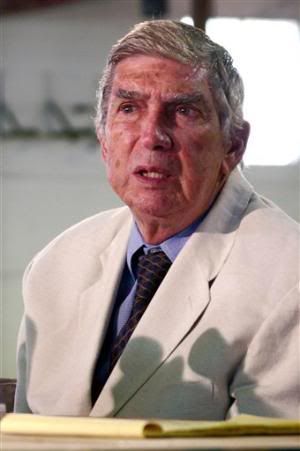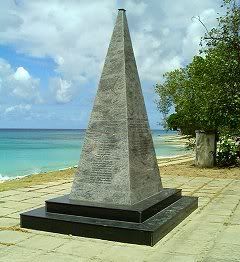Looking fragile and tired in his off-white tropical suit, a grandfatherly Luis Posada Carriles was gently helped out of the car that delivered him to his wife’s house in Miami Thursday as the sun went down. It will be the first time in 23 months that he has not spent the night in federal detention. So it was no surprise that, when asked how he felt, he replied, “Estoy muy contento,” (“I’m very happy.”) To the Cuban-American community he said, “I’m very grateful.”

Happy and grateful and comfortably surrounded by his family, friends and fans while his victims spin in their graves. Except that many of his victims have no graves since they were killed by the bombing of Air Cubana Flight 455 in 1976 when it took off from Barbados. Not all the bodies could be recovered. Among those on board were many teenagers, members of the Cuban fencing team. Says Posada: “No one saw me make a bomb.”

Barbados Monument to those killed in the 1976 bombing.
You may never have heard of Luis Posada Carriles. His is not exactly a household name even though he’s a fugitive wanted in two countries for airline bombing and hotel bombing. Even though, before September 11, 2001, the downing of Flight 455 was the worst terrorist act in the Western Hemisphere. That’s not all he did. Posada got around. He worked for the CIA, he worked for the Venezuelan secret police, he had ties to the Chilean secret police, he was connected to Operation Condor, he helped Oliver North distribute weapons to the terrorist contras of Nicaragua, weapons paid for by illegal sales of other weapons to America’s very good friends, the Iranian ayatollahs. In the genocidal Guatemala of the 1980s, he worked as an “advisor” to counter-guerrilla operatives there.
Don’t take my word for any of this (as if you would anyway). Read the declassified files on Posada held at the National Security Archives. Many files remain classified. A few critics claim other files have been destroyed, a charge impossible, of course, to prove.
No direct evidence exists, but there are suspicions Posada was assisted by high-level American officials in his escape from a Venezuelan jail in 1985. In 2001, he and others were convicted in connection with a bomb plot to kill Castro on the occasion of the old caudillo’s visit to Panama. Posada and his fellow convicts served until 2004 when they were suddenly pardoned by Panamanian President Mireya Moscoso, who had close ties to the Bush Administration. She denied any political motivation. The Administration never condemned the plotters, even though innocents attending Castro’s speech would certainly have been killed if Posada’s terrorists had carried out their mission.
If the Administration had had its way, Posada would never have spent a day in the slammer. Indeed, he wasn’t arrested until the afternoon of the day the Miami Herald published an interview with him that its reporters had undertaken through cloak-and-dagger means at a secret location. Moreover, if the Administration has its way, Posada will never pay for his crimes, never be brought to account, even though there is at least circumstantial evidence that one of his victims was an American citizen, Ronni Moffitt, murdered by a bomb along with the Allende-era Chilean diplomat, Orlando Letelier, in September 1976, on the streets of Washington, D.C.
Peter Kornbluth, director of the Cuba Documentation Project at the National Security Archive, said it best on All Things Considered:
His release sends a message to the world that the United States really is not serious in its war on terrorism. Here’s a guy who has a lifelong résumé of violent acts, blowing up planes, bombing hotels, attempting to blow up ships, assassination efforts against Fidel Castro. …
Here was a case where the Bush Administration could have employed the Patriot Act to hold Posada as a terrorist. All they had to do was certify that he was a terrorist or that his release would be detrimental to U.S. national security interests. And despite the fact that immigration and customs have said to him directly in letters your history of violence means you are a danger to the security of U.S. citizens, they have now let him go. …
Luis Posada Carriles was a litmus test for the Bush Administration. … Instead, they have let him return to his home in Miami where many of his supporters will gather and cheer.
Just about anyone who has lost kin or friends to acts of terror – whether by state-sponsored terror or the acts of free-lancers like Osama bin Laden – is well-acquainted with vengeful desires. For victims of such violence, nothing is too terrible a punishment for the perpetrators. But in a civilized society, that’s what courts are for.
Or at least what courts were for before Mister Bush and his crew took over, came up with torture excuses, “enemy combatants,” secret prisons and jurisdictional no-man’s-lands like Guantánamo, the latter ironically based on the forcibly leased land of the longest surviving one-man dictatorship in the world.
A vengeful person would suggest that perhaps Señor Posada should spend an indefinite period of time there in a permanently lit cell, shackled to the floor, listening to high-decibel rap music instead of the boleros of his youth. Vengeance, however, isn’t justice. And justice is what the old terrorist’s victims cry out for. We are, in a sense, all of us his victims. Victims of a government that is itself above the law, that uses the “war on terror” as just more fuel for its spin machine, all but abandoning the hunt for some terrorists, while all but publicly embracing some others.
Given the number of people who cross the Mexican border illegally every year, it is ridiculous to be trying Luis Posada Carriles for illegally entering the United States. Especially since it’s already been decided by the same federal judiciary that has released him on bail that he can’t be deported either to Cuba or Venezuela – the two countries whose citizens suffered the most from his actions – because he might be tortured there. The ironies pile sky-high.
Another course of action remains. Release all the files on Posada and ship them and him to The Hague for trial under the crimes against humanity section of the Rome Statute of the International Criminal Court. That would be justice. And it will happen when pigs fly.
Most likely, Posada will settle down in Miami, with or without his electronic tracking bracelet, drinking piña coladas or peach daiquiris for the rest of his life. Perhaps he can drive over and play dominoes with his pal in Operation Condor, Orlando Bosch, the murderer and terrorist pardoned by George H.W. Bush in 1990.
[Crossposted at MyLeftWing and Daily Kos.]




